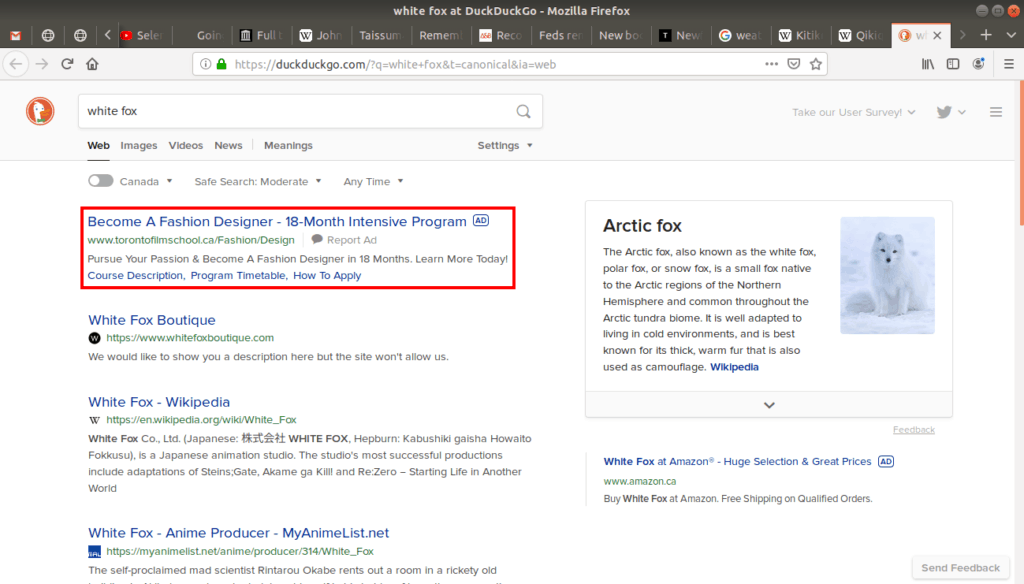Introduction
Search engines are immensely useful tools, and what’s even more amazing is that they’re free! In the previous section I made the analogy that search engines are similar to paper maps, in that they help us navigate our way around the web. But if paper maps cost money, why doesn’t it cost any money to use a search engine?
The makers of search engines do make money. They don’t try to hide how they make their money, but they also don’t go out of their way to explain it either, so when we use their tools, we take for granted that they are businesses and they make money when we use their products. There is a well known saying in the business world: “If you aren’t paying for the product, you are the product.” In this case, it means if we’re not paying money to the search engine, the search engine makers are using our interactions with them, and making money from that.
This section is about search privacy, so while we won’t be focusing on how these businesses make money, it will aid our discuss to talk about this a little.
Business Advertising
Search engine makers make money in a few different ways, but largely their revenue comes from advertising. This is similar to billboards, or television commercials, or newspaper ads. The search engine isn’t trying to sell us any products directly, but allows other companies to show us advertisements when we are searching.
For example, in our previous example, DuckDuckGo returned a result that seemed to have nothing to do with our “white fox” search:

Notice that the “Become A Fashion Designer” ad doesn’t have the phrase white fox in it? DuckDuckGo (and the other search engines) observe our search behaviours, and use this information to guess what kind of ad we might respond to. The business that created the ad paid them to do this.
Imagine that DuckDuckGo observed that many people who searched for “white fox” also searched about becoming a fashion designer. When we made our request about “white fox”, DuckDuckGo remembered this and displayed this ad.
Truthfully, we may not be interested in the ads we see, but companies spend billions of dollars on advertising each year, and if their ad encourages some of us to buy their product, then it is worth it for them.
Advertising Privacy
Advertising relates to privacy because search engine makers compile large records about us from all our search requests. The more information they gather, the better they can target ads to us, which equals more money for their advertisers, but at the cost of our privacy.
Search Engines and Privacy
When search engines record details they learn about us, they keep these as files on computers in large records called databases. Because these companies value our business, these databases are generally kept private, but sometimes businesses are willing to sell the data they’ve collected, or specific categories of it, to other businesses. Government laws exist to regulate privacy practices to keep businesses from misusing the data, but these sort of protections can be limited.
So given all of this, maintaining privacy online is clearly very important. Once private details about us are exposed, those details generally remain a part of the public Internet, as part of Society’s Memory. This is the downside of the Internet, so be careful about what you share online.
The reason I chose DuckDuckGo for our examples is that unlike Google or Bing, it doesn’t collect our data or track us online. Anything it learns about us it uses only to perform our search. After that it intentionally forgets.
——————
To end this section, you might be wondering: does giving out too much of our private information online mean it’s going to absolutely harm us? Though there may be those who would misuse private information to scam, steal, or harm others, it’s possible to go our entire lives without being scammed or harmed online.
It’s similar to living an unhealthy lifestyle: eating too much unhealthy food and not exercising enough are choices we sometimes make; and in the short term doesn’t usually harm us, but in the long run these unhealthy habits add up and can harm us. For a similar reason it’s best to limit what private information you share (even when it’s convenient). Over time it could add up and increase our risk of being harmed.
In the long run, the best solution is to improve laws, education, and bring health to our communities so that people aren’t inclined to scam or harm others in the first place.



